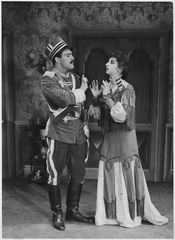| Horse Eats Hat | |
|---|---|
 | |
| Written by | Edwin Denby Orson Welles Based on the play The Italian Straw Hat by Eugène Labiche and Marc-Michel |
| Date premiered | September 26, 1936 |
| Place premiered | Maxine Elliott's Theatre, New York City |
| Original language | English |
| Genre | Farce |
Horse Eats Hat is a 1936 farce play co-written and directed by Orson Welles (at the time 21 years of age) and presented under the auspices of the Federal Theatre Project. It was Welles's second WPA production, after his highly successful Voodoo Macbeth . The script, by Edwin Denby and Welles, was an adaptation of the classic French farce The Italian Straw Hat (French: Un chapeau de paille d'Italie) by Eugène Marin Labiche and Marc-Michel.
Contents
Starring Joseph Cotten, a mainstay of what would become known as the Mercury Theatre, the play premiered at Maxine Elliott's Theatre, New York City, on September 26, 1936, running until December 5, 1936.












